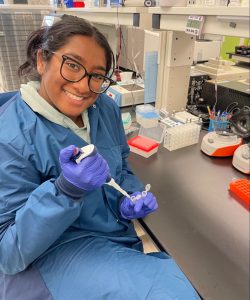ISG GAP and iGEM members Alexandra Carabetta and Michelle Antony interview Maya Patel about her experience as a Diagnostic Genetic Sciences (DGS) major, one of several UConn specialty majors that students can apply to in their sophomore year.
What was your major when you started at UConn and did you have an idea of what you wanted to do after?
My story begins back in my sophomore year of high school. I was taking AP Biology and I really liked the genetics unit and knew I wanted to work in something related to genetics. That’s when I learned about genetic counseling. Genetic counselors in clinical roles provide information about a person’s genetic health by analyzing their family health history, presenting options for genetic testing, and discussing genetic test results. So I started as a Molecular and Cellular Biology (MCB) major. I didn’t know my current major, Diagnostic Genetic Sciences (DGS) existed until the spring semester of my freshman year when I was scrolling through the course catalog.
Why did you decide to pursue the DGS major?
After (obsessively) looking into the DGS website, I found that the program had everything that I was looking for, including a heavy academic focus on genetics, a small cohort of students, hands-on experience with molecular lab techniques, and a built-in “internship” with a research project. Looking back on it, I’m very satisfied with the learning experience and the program as a whole, and I feel very prepared for wherever life takes me.
What is your DGS internship like? What’s your favorite part?
My internship is at Dartmouth Health in their Molecular Pathology laboratory. I’m very lucky to be in a lab where both clinical lab work and research are performed. On a daily basis, I get to see both parts. In the clinical lab, I perform a variety of genetic tests on previously run patient samples and controls, attend tumor boards with doctors, and much more. Some of my favorite types of genetic tests that I’ve performed are ddPCR, sequencing (NGS) tests, and capillary electrophoresis on an automated machine!
Another aspect of my experience is participating in a research project to validate an NGS panel for the lab, which has been extremely rewarding. Overall, I’ve loved being a part of the laboratory team and having the opportunity to independently run these genetic tests (with technician supervision, of course).
Can you tell us more about your research project?
For my project, I’m helping the department validate an NGS pharmacogenetics panel. More specifically, we run previously tested patient samples and double-check that the variant that we originally found in the patient is also found on the NGS panel. Additionally, through the use of whole genome sequencing, we’re able to identify variants that weren’t previously found in these samples. Luckily, we’ve had lots of success with this validation and this panel is nearing completion for clinical use in the lab, which is super exciting!
How did being a part of the DGS program help you with your future plans?
Being a part of DGS gave me a huge advantage in my academics and the workforce. For academics, I was able to receive an education tailored to specific genetic concepts. Classes such as “Cancer, Genetics and the Environment”, and “Cytogenetic Technologies” gave me a strong background that will benefit me in the future. For my career, this internship allows me to practice lab techniques that I would be using if I were to work in a lab. Additionally, I am constantly surrounded by people who are experts in different aspects of genetics. Almost every day, I’m talking to directors, postdoctoral fellows, technologists, pathologists, and many more people who have taught me so much about the genetics workforce.
What extracurricular activities do you enjoy doing outside of academics?
Luckily I’m only 15 minutes away from the Dartmouth campus, so there are
lots of places to shop and eat! My favorite activity near Dartmouth is roaming around the museum and checking out all the cool art. As the days get warmer, the scenery gets more beautiful, and it gets easier to go on long hikes and relaxing walks after coming back from clinical, which is always a treat.
What advice would you give incoming UConn students?
1. Don’t be afraid to reach out: It feels daunting to reach out to a professor or faculty, but the benefits of reaching out and connecting with someone outweigh the negatives. And worse comes to worst, someone either doesn’t respond or says no! It’s not the end of the world, and it will open a lot of doors for you in the future.
2. Believe in yourself: Throughout my undergraduate degree, I felt like I wasn’t doing as much as my fellow classmates, which definitely took a toll on me. But an important thing to note is that every person’s path varies, and there’s no right or wrong direction. Everybody gets to their destination in their own way, and it’s going to look very different from your peers. But if you stick with it and continue on, you’ll suddenly find yourself in the position you dreamed about.
3. Get involved early if possible, but it’s never too late: Getting involved will open up so many opportunities and relationships for you, especially if you do it early. With that being said, it’s never too late to start being involved; I didn’t start getting involved with extracurricular activities at UConn until my sophomore year. So just because you didn’t start the first semester of freshman year doesn’t mean that door is closed forever.
What’s Next?
After completing my internship, I will be taking a small break to reward myself for graduating!
Then, this fall I will start a Genetic Counseling Master’s program at Thomas Jefferson University in Philadelphia, PA. I’m so excited to be continuing my education, and can’t wait to get started!
